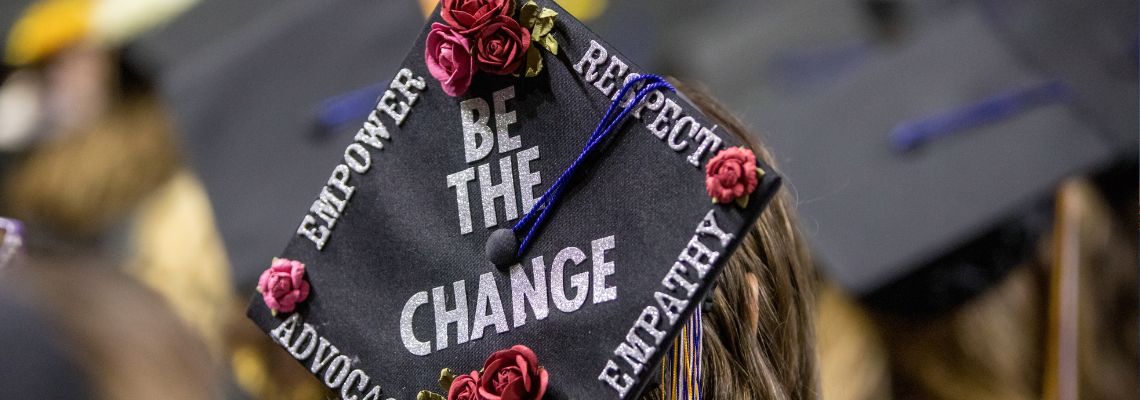Student Spotlights
Q&A
Emma Cost graduated from USM in May 2020 with a Bachelor of Arts degree in Environmental Planning and Policy, while minoring in Economics. She interned at the Greater Portland Council of Governments (GPCOG) and they hired her full-time upon graduation.
What was the most rewarding element(s) of your internship over the 2019-20 academic year?
“One of the most rewarding elements of my internship was applying all my knowledge/skills I had learned from my classes over the years to my work at GPCOG. My professors did an excellent job of preparing us for the ‘real-world’. Another rewarding element of my internship was being asked to stay at GPCOG. At one point, I was juggling my internship, full-time class schedule, soccer, and my other part-time job. However, the long nights of staying up late to complete an assignment, working on the bus as we traveled to our away games, and putting in maximum hours and effort at my internship paid off.”
How did the COVID-19 pandemic impact your internship?
“My workplace announced we were going remote the same day USM did. I was feeling very overwhelmed (as did most). However, most of my work I was doing at GPCOG was on the computer anyway, so it wasn’t a huge shift in responsibilities at work.”
Did your overall experience shift due to COVID-19?
“There were benefits and challenges of completing my internship remotely. My workplace tried to make it feel like nothing had changed. We all signed onto Zoom at 9am on Monday, Wednesday, and Friday to share news, stories, and individual priorities for a half-hour. I still felt connected to my coworkers although we weren’t in the office. It really humanized my supervisors for me as their kids would occasionally run in to say, ‘hi’. My direct team uses Microsoft Teams, which is like the AIM of the professional world. This made quick conversations possible, as if you ran into their office to ask a quick question or bumped into them in the break room. After this spring, I felt much more comfortable and closer to my team than I did last fall. The challenge is working from home. I miss going to a different place to be productive, rather than doing work at my desk in my room for hours at a time. It’s harder to stay focused which is why it’s important to make a to-do list, set goals, and follow a strict schedule.”
What message or advice would you offer an employer that is considering an internship in the current business environment?
“I would highly suggest employers hire interns this year. These students are eager to learn and work hard to prove themselves. With the economy in rough shape, you will be providing these students a head start into their field so they have a better chance of landing a job once it’s over. Although it’s unusual times to hire an intern, they will learn quickly and adapt to remote work. It’s a win-win situation for everyone involved.”
Q&A
What types of career opportunities are within your organization?
Stantec has offices and opportunities all over the world in fields from mechanical engineering to human resources to aviation fuel system managers. We are a very large and diverse company with opportunities for the driven, skilled, and hard-working. Here are just a few opportunities available in Maine right now:
- Project Manager, Portland
- Senior Transmission Project Engineer, Portland
- Aviation Fuel System Engineer, Portland
Visit https://stantec.jobs/ to search for more jobs by location and title.
What is one thing you would tell your younger self about your current occupation?
Never stop exploring. Even if you love your current role, keep learning about other positions in the company and other opportunities to grow your skillset. I have found that in difficult times, it is those with diverse skillsets that are deemed essential to the company.
What do you know now that you wish you would have known when you graduated from college?
When I graduated, I was really fixated on landing my dream career. I wanted to immediately get the high paying job that I would love going to every day. Every day that I did not have that amazing job, I felt like I was letting myself down. Looking back, I set unachievable standards for myself, which I feel a lot of graduates do. What I wish I knew when I graduated is that it is ok to not have a career in your field of study and to be making top dollar the moment you graduate. What is important is to take slow and steady strides toward your goals every day and know that one day, you will get to the place that you really want to be.
How did your earlier career choices lead you to where you are now?
I have always had an idea of my dream career, working indoors and out, doing meaningful work to preserve and study the natural environment. With this career goal in mind, I made necessary moves to become academically and professionally educated in this field and get as close to this ideal as possible. I thought of my former positions as meaningful but, temporary. I did the best that I could in the role and when an opportunity to get closer to my ideal career presented itself, I jumped at it.
What is one piece of practical advice that you would give to someone starting out?
Be over-prepared – for job interviews, your first day, projects – it shows initiative, drive, and greatly reduces stress. It never hurts to plan for a couple likely scenarios and have back-up plans on the ready because things rarely go as planned. Also, I would advise people just starting out to be incredibly organized and ask a lot of questions.
What is one of the biggest struggles people go through when starting their career? What advice do you have to avoid or resolve that struggle?
One of the biggest struggles when that I went through when starting my career was handling rejection. I did well in college and thought that landing a well-paying career in my field would be easy, but it is not. I have applied to and been rejected from countless roles. Sometimes, I even got rejected by computer programs that scanned my resume for keywords. I did not even get rejected by a real person! Rejection happens, a lot, and it is important to keep moving, keep searching, and not be discouraged. It can take people years of searching and applying before they land their perfect job. Continue to network and apply to jobs because you never know what great opportunities may be just around the corner.
What are some mistakes that you made while first searching for a job after college?
Truthfully, I made a bunch. Sending out cover letters with typos after a long night of applying to jobs, mistakenly applying to the same job twice, the list goes on. These mistakes certainly sting when I find them later on or an employer points them out to me but, we’re all human. There is no sense in beating ourselves up over these mistakes. We just have to learn from them and try harder next time.
How many major changes did you go through when you were in college?
I believe I changed my major three times but, I also decided halfway through my college career that I wanted to get an associate degree as well and went after two degrees at once. At USM, I started out as a civil engineer, then switched to a mechanical engineer, then finally landed on environmental science. During my second year at USM (when I started in the environmental science field) I started going to SMCC as well for architecture and engineering design. In my opinion, college is about exploring different options and ultimately, finding out who you are as a professional.
When deciding what you wanted to pursue as a career, how much did you consider your salary, compared to how much you would enjoy the job?
Salary plays a pretty significant role but, finding a role that I really enjoy is certainly most important. You have to be able to pay your bills and live comfortably but ultimately, you’ll spend 40+ years at work so finding something you enjoy is crucial to happiness.
Is this job the original job that you wanted when you were younger?
Not exactly, when I was a kid, I wanted to be Huston… “Like ccckkk Huston, we have a problem, over.” It wasn’t until a few years later that I figured out that Huston is a place and not a person. But I really started figuring my interests out in high school when I fell in love with math and earth sciences. It certainly makes sense that I would up in a career field that incorporates both fields.
What is one thing you wish you could change about your career?
I wish I had more of a balance of work in the field and work from the office. Right now, I mostly work in the office. I am sure if I keep networking with other Stantec departments and keep my eyes peeled for opportunities within the company, I will find my balance soon enough.
Did you always want to be involved in your current industry?
No, I work in the Power and Dams industry at Stantec, which I hadn’t really thought much about as an industry until I was already immersed in it. I certainly enjoy what I do now and have learned a lot but one day, I plan to transition to the Environmental Services industry within Stantec which luckily, is only a few towns away in terms of office locations. I have known for quite some time that I want to work in the field of environmental services. I ended in Power and Dams because that was where there was an open position within the company. I have found that for me, it is important to get my foot in the door of this growing and successful company then make slow and steady strides toward my ideal role.
How long did it take after college to be employed in your intended industry?
I am still working to be in the Environmental Services industry but am closer than ever. I now work at this amazing company that I have dreamed of working at. Now that I am here, I have begun making moves toward my ideal position within the company by networking, making my intentions clear to my superiors, and assisting on projects in my desired field whenever possible. So to answer the question, it will hopefully be 2-3 post-graduation that I am employed in my intended industry.
How did you set yourself apart from other people in the industry?
To set myself apart from other people in my current industry, I really just try to be myself. I am already pretty different from everyone else in my industry because 90% of the employees are middle-aged men. But by being myself, I mean that I try to bring my best qualities to work with me every day and those are my ability to work hard, open-mindedness, and need to help others. Another thing that also sets me apart is that I am eager to grow as a professional. I like to pay close attention to the quality of work that others put out, how employees interact with one another and clients, and how others interact with me. I try to pick out best practices and qualities of other employees and incorporate them into how I work and interact. For example, I noticed that my boss always comes to my teammate Drew when searching for certain files and emails. Drew is great at keeping documents and correspondence organized so to better myself, I have created my own file and correspondence system similar to Drew’s system.
What is one piece of advice would give to someone that is starting out?
Be over-prepared – for job interview, your first day, projects – it shows initiative, drive, and greatly reduce stress. It never hurts to plan for a could scenarios and have back-up plans on the ready because things rarely go as planned. Also, I would advise people just starting out to be incredibly organized and ask questions.
What are common misconceptions people have about your industry?
I don’t really know of many misconceptions relating to my industry but one that I frequently encounter is that when people hear the Power and Dams industry, they tend to think that we only design and work on hydroelectric dams. The Power and Dams industry does design and work on hydroelectric dams but also designs and works on solar panel systems, wind farms, paper mills, wastewater treatment plants, and several other related projects.
What is the biggest challenge in your field at the moment?
I am sure that this is true for many but, handling the pandemic has been very challenging. Most our work stems from construction workers and field work which involves a lot of face-to-face interactions and shared workspaces. When the construction ceased, the need for project administration and engineering ceased as well. The biggest challenge that we are facing right now, is getting people back to work and back to work full-time. Luckily, power and dams is an essential industry so my sector wasn’t impacted quite as drastically by the pandemic as other Stantec industries.
What techniques have you learned to manage the stress and struggles of your job?
In my current industry and industries that I have worked in the past, I have managed stress by 1) making a clear list of tasks in order of priority, 2) asking clarifying questions to be positive that I understand what is being asked of me, and 3) get the work done immediately without procrastination. There will always be work-related stress, but I have found that it is more than manageable by doing these three things.
How much of your work isn’t discussed when asked about your job?
Probably 90% of what I do is not discussed when asked about my job. I typically tell people that I do project administration and if I feel like I haven’t bored them yet, I will tell them that I am the final line of QA/QC for outgoing documents and drawings, manage all incoming files and correspondence for several projects at once, and do engineering work whenever I am able on projects. What I typically do not discuss is the building of new databases by coding, the details of drawings and documents that I create and review, and specific project details. People typically are not interested in the nitty gritty details.
Student Testimonials
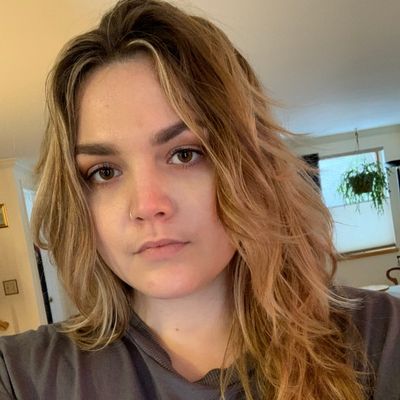
“The Career Hub helped me streamline my path at USM. The Hub team not only gave me career search engines where I could find job titles, their associated degrees, and salaries, but also showed me classes and programs I had never considered to get me to those careers and reach my goals. Their suggestions helped me refine and tailor my class choices so I am best prepared to meet my goals after I finish my degree. The Career Hub’s advice and suggestions were all new to me; I’m so glad I took advantage of this resource as it opened the right doors so my USM experience could be as relevant as possible to my post-university vision. I’m thrilled that the Career Hub took the time to help me feel confident with my classes and confident in my future.”
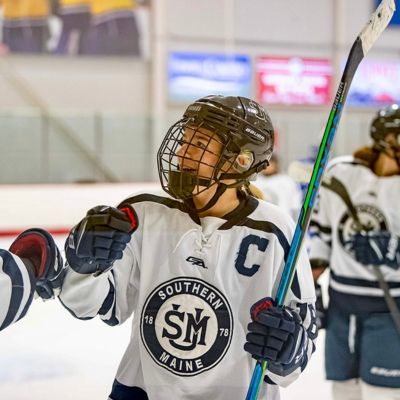
“From helping to develop my resumes 3 years ago, guiding me to obtaining my first marketing internship, to now providing a place of employment as I act as a graduate assistant of the department, I have learned from all facets of the Career Hub.
A few years ago when it came time for me to begin looking at internships at the undergraduate level, I was lost at how to even get started. I ended up setting up a meeting with … one of the Career Advisors here in the Career Hub, and … completely revamped my resume … The outcome was something I was now very proud to send to future employers, knowing that it highlighted every skill I had previously spent my time developing.
Through my time working in collaboration with the Career Hub I have been able to participate in 3 different internships, several job fairs, and countless hours of career guidance. Without their help I know I would not have been able to accomplish what I have…
I am grateful that USM has such a resource available for its students, and that I was able to utilize it in my time here at USM, and hope to be able to continue to build and maintain the relationships I have created with them far beyond graduation.”
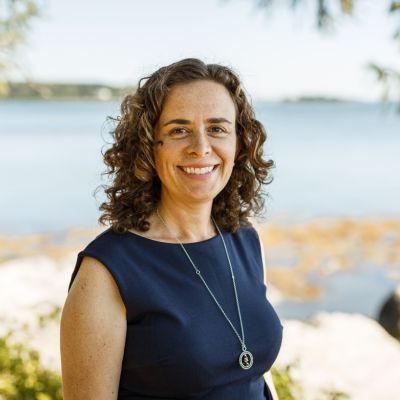
“The Career Center provided a great sounding board to talk through the skills I gained in my Master’s in Leadership and Organizational Studies. I wanted to transition into a new field while leveraging my 20 years of prior experience.
[My Career Advisor] connected me with professionals in the field to learn more about career paths in human resources and organization development… [My Career Advisor] also helped with practical matters like CV design and guidance on how to tell my story during interviews…[and] was a key advisor and cheerleader through my career shift and helped me maintain patience to find the right position.”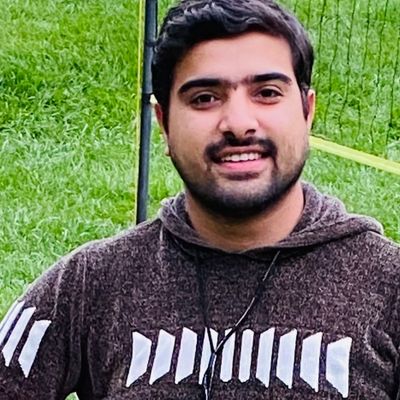
“The USM Career Hub is a team of brilliant planners with knowledge in a multitude of backgrounds. You don’t need to have many years of experience or to be a guru to get an internship or job. These brilliant people will find your unique background and make that your strength while applying for a job. In my sophomore year at USM, I had a plan to apply to internships. Since I was a beginner, I first gained some research experience at a laboratory that I am extremely grateful about. During my internship, the Career Hub supported me and furthered my steps towards my ambition.
In the late phase of my internship, I was actively looking for career advancement options. I had multiple video sessions with Hub team members which were my life-changing steps. After multiple interviews, I was able to secure an Assistant Clinical Research Coordinator position at Stanford University School of Medicine. This current position provides me with in-depth knowledge of clinical medicine and research that will strengthen me towards my further education in a Doctor of Medicine (MD) career.
I am a first-generation college student, a first-generation immigrant, and come from a disadvantaged background in the rural hills of Nepal. I am highly thankful to the USM community and the Career Hub for supporting me towards my ambition.”
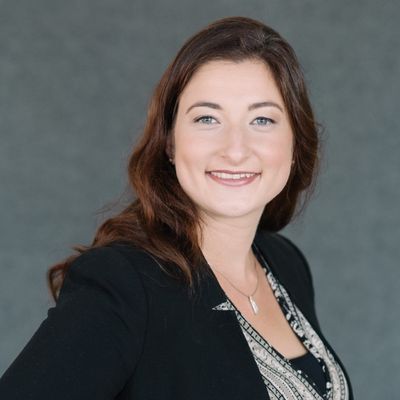
“I want to thank the Career Hub from the bottom of my heart for all the advice, support and encouragement over the last two years…. The Hub helped me to gain confidence and realize the power of my empathetic and adaptable nature and how I can apply it professionally…. The Career Hub has been a huge resource for me, and I can’t recommend it enough to other students.
About halfway through my MBA program, during the Hub’s networking dinner, I coincidentally sat next to the Director of a local organization…. A conversation [with them] at that event ultimately led to an internship in Small Business Development, which was an amazing experience for me and allowed me to carry out my passion of supporting and learning about local small businesses. Each step of the way during my time at USM, the Career Hub was there for me as I got to know myself better personally and professionally and determined where I wanted to launch my career path. It’s clear the Career Hub team is passionate about their work and I always felt so uplifted after our meetings.”


